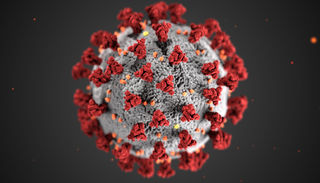Coronavirus Disease 2019
DeepMind Uses AI to Help Fight COVID-19
AlphaFold predicts structure of proteins associated with coronavirus SARS-CoV-2.
Posted March 15, 2020

The world is facing a global public health crisis due to the COVID-19 pandemic caused by the novel coronavirus named SARS-CoV-2. This is a new pathogen, and scientists around the world are researching the SARS-CoV-2 coronavirus in order to develop therapeutics to treat, cure or prevent the COVID-19 disease. In early March, artificial intelligence (AI) developer DeepMind announced the use of its AlphaFold deep learning system to predict protein structures associated with the COVID-19 disease in efforts to help scientists understand how to fight the SARS-CoV-2 coronavirus.
COVID-19 was first disclosed in Wuhan, the capital city of the Hubei Province with a population of 11 million in the People’s Republic of China during winter of 2019. A few days ago, the World Health Organization (WHO) has declared COVID-19 a pandemic.
On March 13, 2020, WHO Director-General Dr. Tedros Adhanom Ghebreyesus stated that Europe is now the epicenter of the pandemic, and the United States declared the COVID-19 disease outbreak a national emergency.
According to WHO figures published on March 14, 2020, COVID-19 has spread worldwide to 135 countries and territories outside of China, with 142,539 confirmed COVID-19 cases and 5393 deaths. The WHO reports that most COVID-19 deaths (3194 fatalities) occurred in China alone where there are 81,021 confirmed cases.
Outside of China, the WHO identifies the areas with the highest number of COVID-19 cases to include Italy (17,660), the Islamic Republic of Iran (11,364), the Republic of Korea (8,086), Spain (4,231), France (3,640), Germany (3,062), the United States of America (1,678), Switzerland (1,125), the Netherlands (804), the United Kingdom (802), Denmark (801), Sweden (775), Norway (750), Japan (716), the cruise ship Diamond Princess (697), Belgium (599), Austria (504), and more countries and territories.
The actual number of COVID-19 cases in countries where testing has been limited will likely be much higher. According to figures from Our World in Data, a collaboration between the University of Oxford and the nonprofit Global Change Data Lab, the latest figures available on countries that have reported performing over 2,000 COVID-19 tests include China-Guangdong (320,000), South Korea (248,647), Italy (86,011), Russia (76,963), the United Kingdom (29,764), Taiwan (16,089), Canada (Ontario 4,185, Alberta 4,288, British Columbia 2,008), Japan (10,205), Bahrain (9,201), Australia (New South Wales 8008, Government of the Australian Capital Territory 649), Norway (8,000), France (6,628), Austria (6,582), The Netherlands (6,000), Thailand (5,232), Vietnam (4,588), India (4,058), Malaysia (4,010) Switzerland (4,000), Israel (3,872), Denmark (3,839), Slovenia (3,058), the Czech Republic (2,353), and Poland (2,234).
The same report shows two different tracking figures for COVID-19 testing in the United States as of March 12, 2020. One is from the Centers for Disease Control and Prevention (CDC) at 13,624, which is the sum of the number of specimens tested for SARS CoV-2 by CDC labs (3,903) and U.S. public health laboratories (9,721). The other U.S. figure is 7,934 reported by the COVID-Tracking project estimate, a volunteer-run initiative started by Jeff Hammerbacher, Founder and General Partner at Related Sciences with staff writers Robinson Meyer and Alexis C. Madrigal at The Atlantic. The COVID Tracking Project figures are limited because it’s based on the sum of individual state reporting, and not all states report negative tests.
Former child chess prodigy, Go player, and neuroscientist Demis Hassabis co-founded DeepMind Technologies in 2010 in London along with Mustafa Suleyman and Shane Legg. Its investors included Elon Musk, Peter Thiel, Scott Banister, Jaan Tallinn, Horizons Ventures, and the Founders Fund. Four years later it was acquired by Google, and by 2015 it became a wholly owned subsidiary of Alphabet, Incorporated. DeepMind made AI history when its AlphaGo software was the first computer program to beat a professional human GO player, the European champion Fan Hui, in a series of games in October 2015.
Proteins are macromolecules (large biomolecules) that are made of one or more long chains of amino acid. Understanding the structure of a protein may provide clues on its function. Figure out the function, and scientist may have a way to create therapeutic drugs that work in conjunction with the protein’s structure. Traditional protein structure prediction techniques using X-ray crystallography, nuclear magnetic resonance, or cryo-electron microscopy are time-consuming, labor-intensive endeavors with trial and error testing that could take years. By deploying the patter-recognition capabilities of AI machine learning, namely deep learning, scientists can significantly accelerate their research by reducing the time required to determine the protein structure.
DeepMind’s AlphaFold is a protein structure prediction system that came in first place in the 2018 CASP (Critical Assessment of protein Structure Prediction) competition. The central component of the AlphaFold system is the convolutional neural network that is trained on structures extracted from the Protein Data Bank (PDB), a database for three-dimensional structural data of biological molecules such as nucleic acids and proteins. AlphaFold’s neural network training time was around 5 days for 600,000 steps.
AlphaFold is a neural network trained to make predictions about the structure of a protein given its sequence, using stochastic gradient descent on the protein-specific potential. DeepMind’s latest AlphaFold system can “free model” by predicting protein structures with a high level of accuracy even when no structures of similar proteins are available. DeepMind has released the predicted structures under open license to help SARS-CoV-2 researchers around the world in their pursuit of fighting the COVID-19 pandemic.
Copyright © 2020 Cami Rosso All rights reserved.




